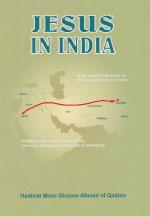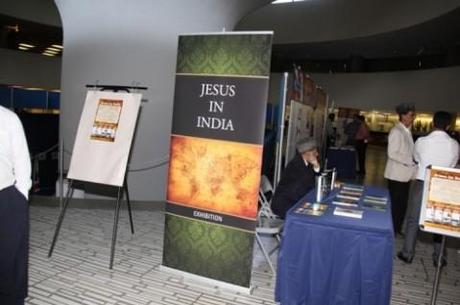Jesus in India: A Book from 1899
By Hazrat Mirza Ghulam Ahmad Qadiani (peace be upon him)

Jesus in India is an English version of Masih Hindustan mein, an Urdu treatise written by the Holy Founder of the Ahmadiyya Movement in Islam, Hazrat Mirza Ghulam Ahmad (1835 – 1908). The Urdu treatise was published in 1899. The main thesis expounded in the treatise is Jesus’ escape from an ignominious death on the Cross and his subsequent journey to India in quest of the lost tribes of Israel whom he had to gather into his fold as mentioned in the New Testament. Abundant evidence has been furnished from Christian as well as Muslim Scriptures, old medical books and books of history, including ancient Buddhist records, to illustrate the theme. Starting upon his journey from Jerusalem and passing from thence through Nasibus and Iran, Jesus is shown to have reached Afghanistan, where he met the Jews who had settled there after their deliverance from the bondage of Nebuchadnezzar. From Afghanistan Jesus went to Kashmir, where some Israelite tribes had also settled. He made this place his home and here he died. His tomb has been traced and found in Khanyar Street, Srinagar. To read the full book click here


If Jesus did not die upon the cross: A study in evidence, is a small booklet with a very descriptive title, written by an Australian Judge, Ernest Brougham Docker, in 1920. He became a judge of the District Court and chairman of Quarter Sessions for the north-western district in 1881. He retired in 1918 after the passage of the Judges Retirement Act. Ernest Brougham Docker writes in the fourteenth chapter of his short book: But I must here notice the old legend which I have before referred to. A modern version of it was given in the periodical The East and the West some years ago. Briefly, it is to the effect that Jesus did not die on the cross, but recovered under treatment, a miraculous ointment being applied to His wounds, which healed in the space of forty days; that He journeyed to India to preach to the lost tribes of Israel; and eventually died at Srinagar, where a tomb is pointed out to this day as His.
Though I do not know of any evidence tending to establish the substantial truth of this account, I desire to point out that there is nothing unreason¬able or improbable about it. We are told from other sources that there are to the present day in Afghanistan and Bactria tribes of unmistakable Hebrew type. It is surprising to find the number of passages in the New Testament writings which, if they do not corroborate the story, at least are consonant with it. Is it unreasonable then to suppose that Jesus, finding it unsafe to remain in Judaea or Galilee longer than the forty days during which He is said to have instructed His disciples in the things concerning the Kingdom of God (Acts i. 3), should feel called to carry the message of the Kingdom to the lost tribes of the House of Israel?
*This blog is completely unofficial and in no way represents Islam Ahmadiyya or the views of anyone except the author themself.*

